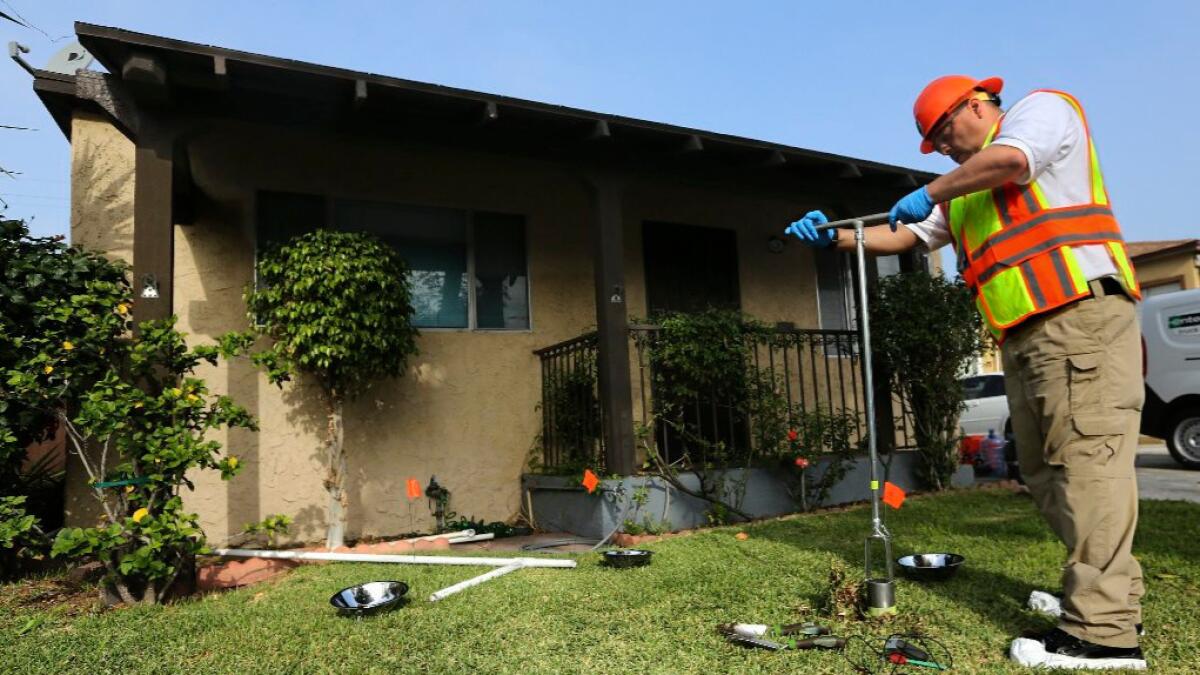Californians would pay $1 car battery fee for toxic cleanup under bill sent to governor

Californians who purchase lead-acid car batteries would pay a $1 fee under legislation sent to Gov. Jerry Brown early Thursday morning, with the funds earmarked for cleaning contaminated sites, including communities near the former Exide battery plant in Los Angeles County.
The legislation by Assemblywoman Cristina Garcia (D-Bell Gardens) would charge consumers and manufacturers a $1 fee on each lead-acid battery sold, generating up to $40 million a year.
The money would be deposited into a fund to be used by the state Department of Toxic Substances Control to clean brain-damaging lead from sites across the state contaminated by the battery industry.
The state Legislature is sending a clear message to residents ...that they do matter and we will no longer let them sit on poisoned soil
— Assemblywoman Cristina Garcia (D-Bell Gardens)
The bill was the final piece of legislation taken up before the Legislature adjourned, and it received a quick bipartisan vote in both houses within a span of only a few minutes. Garcia said there were late negotiations with the Brown administration on the final details.
In a statement, Garcia said “the state Legislature is sending a clear message to residents in the affected communities that they do matter and we will no longer let them sit on poisoned soil.”
AB 2153, if signed into law, would not take effect until April 1, 2017. Battery manufacturers and consumers would each pay $1 fees on each new battery for the first five years of the proposal; after that, the full $2 fee would be shouldered by consumers.
Some Republican legislators said that setup is a mistake.
“This tax is regressive,” Assemblyman Travis Allen (R-Huntington Beach) said during the midnight debate. “It’s paid by the people who make the least amount of money.”
A new source of funds could boost the massive effort to find and remove lead-contaminated soil from half a dozen communities near the closed Exide Technologies battery recycling plant in Vernon, where regulators believe decades of air pollution fouled up to 10,000 homes.
For now, the project is tapping $176.6 million from the state’s general fund under a plan approved by Brown earlier this year. But a full cleanup could ultimately cost hundreds of millions, and that will be difficult to recover from Exide and any other responsible parties.
The legislation would not limit the ability of state regulators to go after the battery industry for the costs of cleaning lead contamination it caused. However, if a state agency successfully sues a battery company, it would receive credit for what it paid into the fund
Jane Williams, executive director of California Communities Against Toxics, who pushed for the legislation, called it “the first funding passed by the Legislature in over a generation for the cleanup of toxic sites in California.”
“With this revenue stream, the state will have the opportunity to clean up homes, parks and schools in our state’s most vulnerable communities,” Williams added.
Sean Hecht, a UCLA law professor who helped negotiate the bill’s language with environmentalists, industry and lawmakers, said its passage was remarkable and will raise “far more money up front than we otherwise would expect from suing those responsible, including companies that sent batteries to facilities like Exide.”
Garcia’s office said the fees could also pay for cleanups at 14 other sites in California where lead smelters may have operated in the past. Several sites in Los Angeles County and the Bay Area are on a U.S. Environmental Protection Agency list of potential smelting operations that were unknown to state and federal regulators until identified in a 2001 study.
Between 16 million and 20 million lead-acid batteries are purchased a year in California for use in starting cars, trucks, boats and other vehicles. Virtually all of them are melted down at smelters, recycling facilities that have frequently run into trouble with environmental regulators for polluting the air, soil and water with lead, arsenic and other dangerous contaminants.
With the closure of Exide last year under a deal with federal prosecutors, the only lead-acid battery smelter still operating in the state is Quemetco Inc. in the City of Industry. The state toxics department is overseeing soil tests for lead in an area of about 300 homes within one-quarter mile of that facility.
More to Read
Sign up for Essential California
The most important California stories and recommendations in your inbox every morning.
You may occasionally receive promotional content from the Los Angeles Times.












